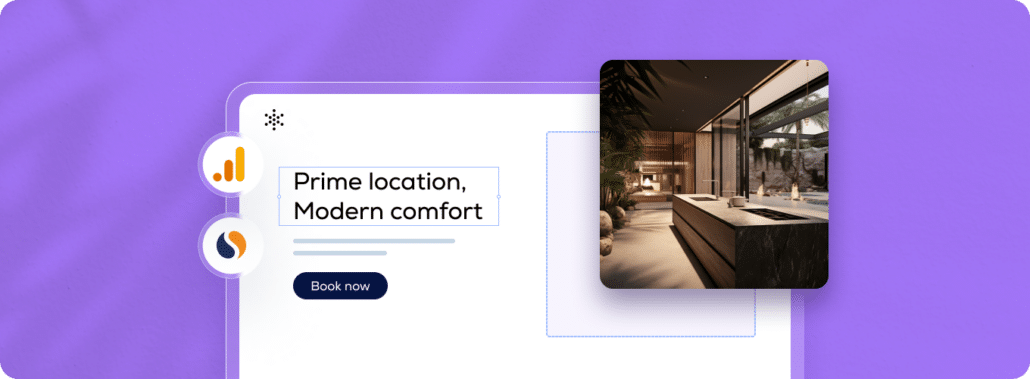Not sure whether you need your own direct booking site? Let us convince you!
The importance of having a direct bookings website is two-fold. First and foremost, with a direct bookings site, travelers are able to book accommodation directly from you; meaning you do not pay commission to a third-party site. The second advantage is the opportunity to showcase your brand.
Part of having the best vacation rental brand out there is having a great website to match it. Your website should be attractive, well-designed, well-written, and user-friendly. Many actually argue that the guest experience begins when a traveler first visits your website – and has a positive online user experience. So make sure every guest’s first interaction is as meaningful as possible.
Your Brand’s DNA
Your brand’s DNA should be at the forefront of all your marketing activities. This goes for your website too. In fact, this is arguably the most important place to make sure your messaging and tone of voice are completely on point. With every decision that is made related to your website, you should be asking yourself, is this in-line with our brand?
There are a couple of ways you can check whether your website is truly in line with your brand:
- The scratch and sniff test
If you take out your company’s name and logo from your website completely, would visitors still recognize it as your site? Or would it be able to pass for a competitor’s website? By conducting this test you will understand whether your website really stands out as your own.
- Company user testing
Get employees from within your company to test out the user experience of your website as a potential booker. They should provide you with feedback on the user experience and journey – whether it resonates with your brand and how you want guests to feel when they book online and when they stay at your property.
Let’s talk about website layout
First you need to choose your website builder. There are many website builders out there to choose from and the choice can be overwhelming. To help in the decision making process, below is a list of the most important features to consider when choosing a website builder:
- Choice of templates
Specifically, how many options do they have, and most importantly, are they appropriate for a booking website?
- Customization options
Are you able to customize your site, including colors, fonts, and custom code?
- Ease of use
Being able to customize isn’t enough – you should also have the ability to customize easily, and have the flexibility to customize on your own, without the need to wait on an external professional.
- Ability to integrate with your tech
It is important to use a website builder that is compatible with the hospitality industry. For example, your website needs to be compatible with your booking engine, have a relevant design for search results, and support reviews and ratings.

Mobile compatibility
Today we live in a mobile-first world and ensuring guests can easily book on your website through their mobile phone or tablet is a must. This means that you have to make sure your website is mobile compatible. As cell phone screens are smaller and normally a different orientation to desktop screens, web pages that are not optimized for other devices will be difficult to use and may drive users away from your site.
What this means in practice is that if a site is not optimized for mobile, a user may not be able to see the full site on their cell phone or tablet, and may miss information and messaging that you have spent valuable time perfecting.
Pro-tip: Some website builders automatically optimize for mobile – like Guesty’s Website Builder – but not all do, so double check this and make sure to optimize manually if necessary.

Increase bookings on your website
You’ve created a professional direct booking website with a great user experience, the messaging speaks to your visitors, now get them to book.
In our experience, the best way to get travelers to book directly from your site rather than through an online travel agency (OTA) is by offering more value, and being loud about it.
What do we mean? Offer some sort of promotion and make sure visitors to your site are aware of it.
This could be anything from offering a discount or an upgrade for booking directly on your site, or a free gift at check-in. Once you have decided on the promotion you are going to offer, you need to make sure travelers are aware it exists; if not it is redundant. One way you can do this is by using a banner or a pop-up on the home page. It’s important that the details of the promotion are clear and simple, and ideally, the promotion is well-designed and eye-catching.
Analytics – knowledge is power
Tracking the performance of your website can be immensely beneficial for understanding your business and the strength of your brand, and for identifying where to allocate resources for improvement.
Performance data provides you with the knowledge needed to make strategic, data-driven decisions, rather than assumptions; and to identify areas that need improvement sooner rather than later. In addition, there are a number of tools available today that give you insight into the performance of your competitors’ websites and online strategies. This data is invaluable and can give you context for realistic benchmarks, insight into the potential for your business, as well as inspiration for new strategies.
Popular tools to consider include Google Analytics, Semrush, Moz, and Similarweb.
Pro tip: You can supplement these leading analytics tools with additional analytics via Guesty’s Website Builder.

Metrics to track
There are many metrics you can track on a direct booking site, each providing deeper context. Here we will outline the most important metrics to provide you with a basic understanding of your company’s online presence.
It’s important to note that there are a number of analytics tools available (mentioned above) and they all use varying terminology. When using a tool, invest the time in getting a full understanding of what each metric is telling you. Below we outlined some of the metrics we think are most valuable to track, but make sure to check the terminology and definition used by the specific tool you are using, so you know exactly what you’re looking at.
When looking at analytics data, you always need to select the timeframe and region you want to analyze. Most analytics tools will allow you to define these parameters.
| Metric | Explanation |
| Total Visits | The total number of views to your site, including repeat visitors |
| Unique Visits | The number of unique visitors to your site |
| New Users | The ratio of new visitors compared to returning visitors to your site. This can be presented as a number or as a percentage |
| Average time spent | Average time spent on your site per visit |
| Pages per visit | Number of pages typically visited per visit |
| Bounce rate | The percentage of visits to your site that end after only visiting one page |
| Conversion rate | The percentage of visits to your site that end in a booking |
| Traffic channels | This gives you context on how traffic is arriving to your site; whether organically, through paid advertising, or via any other means |
To sum up
Having your own direct bookings website can help to widen those profit margins and really take your business to the next level. However, having the site alone is not what will do that. It needs to be user-friendly (on all devices), and entice visitors to book.
